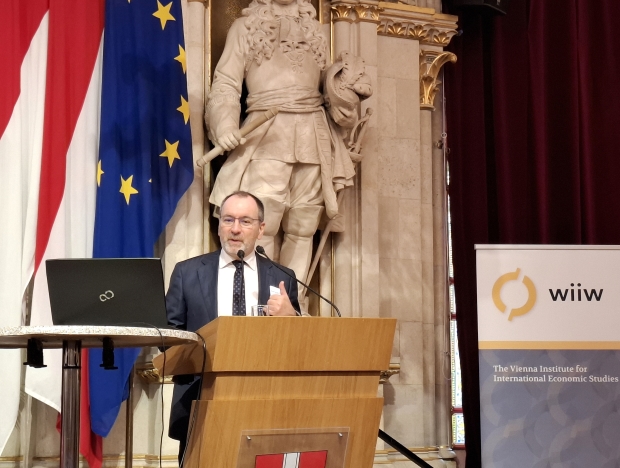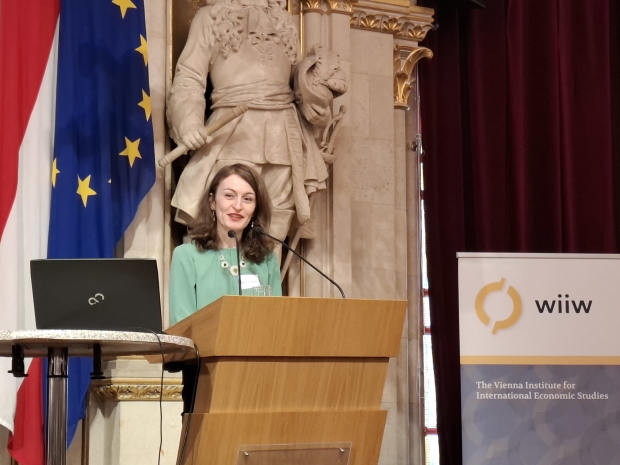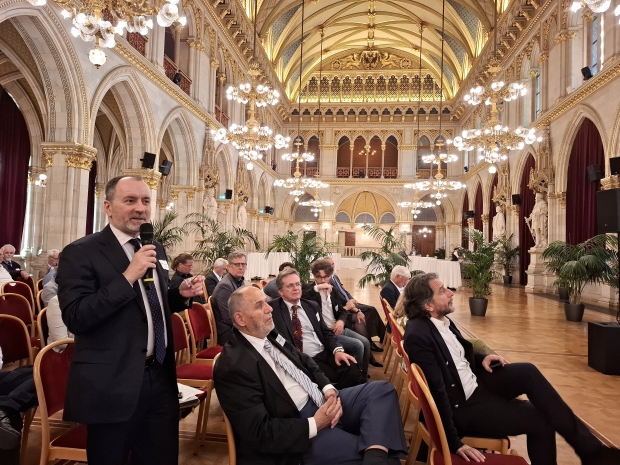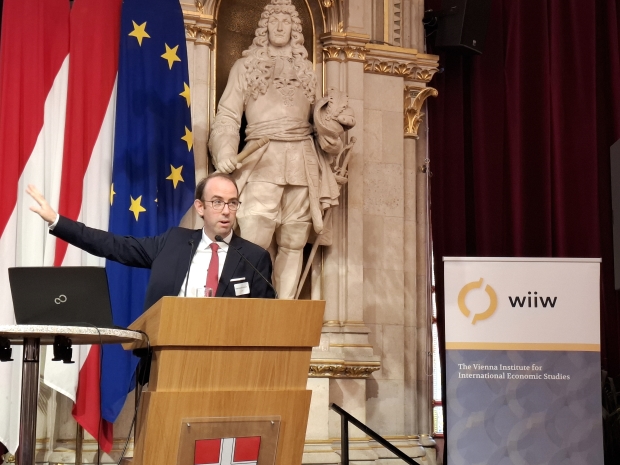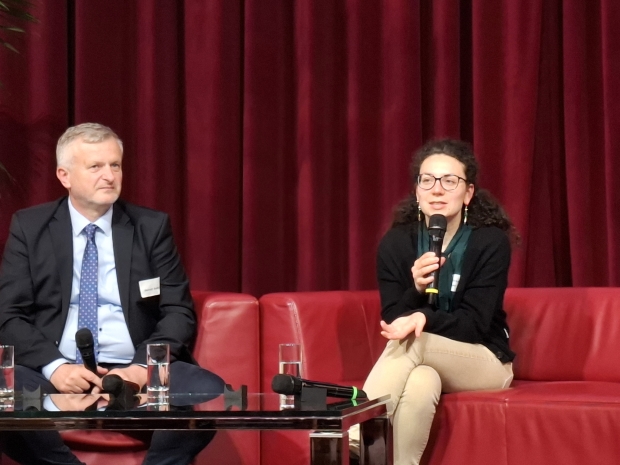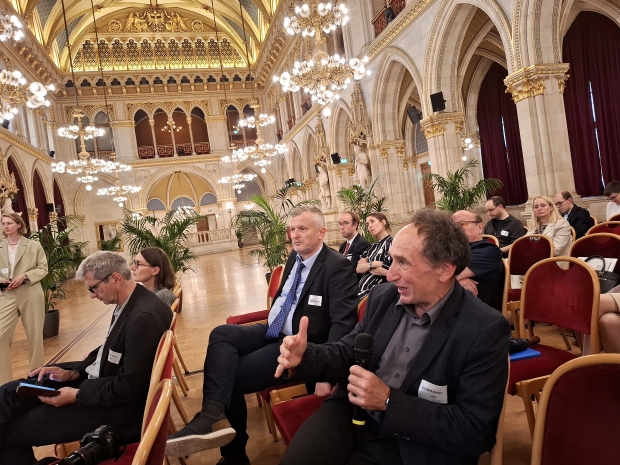Central Europe’s urban boom, rural decline, and Ukraine’s path to post-war recovery
23 September 2025
At wiiw’s 2025 Spring Seminar, experts delved into the challenges and opportunities for regional development in Central, East and Southeast Europe
By Andreas Knapp, Monzerrath Ortiz, Anna-Sanziana Beschia
image credit: wiiw/Andreas Knapp
On 3 June 2025, the Vienna Institute for International Economic Studies (wiiw) hosted its annual Spring Seminar in cooperation with the City of Vienna and the Centre for Public Administration Research (KDZ). The event gathered scholars, journalists and speakers from across Europe for a discussion on ‘Growing Cities vs. Shrinking Countryside in Central Europe’.
The day-long seminar began with opening addresses by Florian Schütz (Member of the Vienna City Council), Hannes Swoboda (President of wiiw) and Mario Holzner (Executive Director of wiiw). A series of presentations and panel discussions followed the welcoming addresses, featuring speakers from the London School of Economics and Political Science, Cardiff University, the OECD and the KDZ, among others.
Here are the summaries of the event’s keynote addresses and presentations.
Keynote 1: Andrés Rodriguez-Pose on ‘Political trust and economic development in European regions’
Rodriguez-Pose explored growing regional inequality in Europe and its impact on public distrust in the EU at large. He explained that many regions are stuck in ‘development traps’ characterised by limited economic growth and employment opportunities. Such regions have experienced prolonged underdevelopment, suffering from weak economic conditions and institutional capacities to meet administrative, healthcare, education and financial challenges. This has led to increasing euroscepticism in these regions.
As a result, more of these poorer regions have turned against the EU and instead embraced radical, anti-EU politics. Rodriguez-Pose warned that while EU policies increasingly rely on centralised strategies and national plans that fail to account for the specific needs of less-developed regions, they often neglect regional cohesion, as EU support does not always reflect the requirements of places in a development trap.
Therefore, the EU should invest and tailor support for building local capacity, education, infrastructure and institutional development in all regions, according to their specific needs. Rodriguez-Pose pointed out that ‘there can be no more competitive Europe, no more secure Europe, no green or digital transition, nor a well-functioning Single Market, nor a more innovative Europe without economic cohesion’.
Keynote 2: Dr. Alexandra Sandu on ‘The post-socialist cities from Central and Eastern Europe: between spatial growth and demographic decline’
Sandu explored post-socialist urban development in Central and Eastern Europe (CEE), focusing on CEE cities that have simultaneously seen geographic expansion and population decline. She explained that following the end of socialism, many cities began to grow while also experiencing a shrinking population due to low birth rates and migration to Western Europe.
Smaller towns were especially affected by these trends, leading to uncoordinated planning and development on city outskirts. Many of these areas have been neglected while cities have grown. Along with urban growth, there has also been an expansion of so-called brownfield sites, meaning abandoned industrial and commercial areas on the outskirts of cities.
Sandu warned that ‘shrinking cities aren’t a failure – but ignoring them might be,’ as she called for smarter planning that involves not only building new areas, but also confronting and ‘repairing’ the areas that have been neglected.
Richard Grieveson on wiiw's Spring Forecast for Central, East and Southeast Europe
Richard Grieveson, Deputy Director of the Vienna Institute for International Economic Studies (wiiw), presented the institute’s Spring Forecast for 23 countries in Central, East and Southeast Europe (CESEE). His analysis covered the ripple effects of US tariffs, the EU’s drive to boost defence spending, Ukraine’s economic outlook and the region’s longer-term growth prospects.
According to wiiw, the economies in CESEE are relatively shielded from the impact of higher US tariffs, given their limited trade exposure to America. The greater risk lies with Germany and those countries most tightly bound to Germany’s ailing industrial sector, such as Slovakia, Hungary and Romania. For now, however, growth in the region remains underpinned by buoyant private consumption, fuelled by rising real wages.
On Ukraine, Grieveson noted that a ceasefire and subsequent reconstruction effort could spark demand for construction materials, labour and expertise from neighbouring states, potentially providing a significant boost to their economies. Yet the outlook remains clouded by President Trump’s new Ukraine policy, war-related destruction in the country, high inflation, acute labour shortages and, first and foremost, the further course of the war.
Looking further ahead, Grieveson struck a more cautious tone. He warned that the growth model underpinning much of the economic success of EU members in the region – serving as an ‘extended workbench’ for Western firms through labour-intensive production – is increasingly approaching its limits. To converge with Western Europe in terms of productivity and living standards, EU member states in the region must pivot towards innovation by investing more heavily in research and development, education, and targeted industrial policies. Only then, he argued, will they be able to move up the global value chain.
Presentations on the challenges for the regional development of Ukraine: European lessons learned from territorial reform, transition and EU accession processes
This part of the Spring Seminar featured presentations by Dr Andrej Horvat, Deputy Programme Director of U-LEAD with Europe (Kyiv), and Ambre Maucorps, an economist at wiiw specialising in regional development.
Horvat’s presentation examined new approaches to regional development in Ukraine. He focused in particular on the Ukraine Local Empowerment, Accountability and Development (U-LEAD) programme, which promotes reform, EU integration, reconstruction and development. By fostering partnerships between EU and Ukrainian municipalities, the U-LEAD initiative seeks to support Ukraine’s post-war recovery and long-term growth.
Maucorps’ presentation examined Ukraine’s path towards EU accession, outlining the institutional, administrative and programming strategies required. This involves ensuring transparent funding, engaging regional authorities and local stakeholders in administrative processes, and adhering to key EU Cohesion Policy principles – notably, subsidiarity, efficiency, accountability and the decision-making role of local authorities.

